Tom Kepler's Blog, page 26
June 17, 2013
Book Review--Retirement: A Memoir and Guide
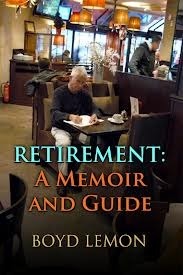 The main point of Boyd Lemon's Retirement: A Memoir and Guide is that retirement is not primarily an outer process but an inner one. To have a successful, fulfilling retirement, one must understand this basic truth.
The main point of Boyd Lemon's Retirement: A Memoir and Guide is that retirement is not primarily an outer process but an inner one. To have a successful, fulfilling retirement, one must understand this basic truth.Lemon's insights and personal experiences related in his book center around his inner growth. As a reader, I found it personally interesting that Lemon in his 60's and 70's discovered meditation and writing, where I began practicing the Transcendental Meditation technique and discovered my passion for writing as a young man prior to my 21st birthday. We reached the mountain top from two different sides of the mountain, one might say.
My life has included the pursuit of inner development, excellence in writing, and a career in teaching. Lemon's admission is that he followed a life engaged in outer activity, recognizing the need for knowledge of self and discovering his passion for writing in the last ten years.
One of the great strengths of his book is that the author has asked himself many questions in the last ten years--and he includes those questions and reflections in the book. Whether or not a reader has already addressed those issues, asking those questions again from the new perspective of retirement is significant. Some of the memoir portions of the book that address the significant questions I found over-long with too much detail, yet others I found spot-on in both perspective, tone, and length.
A great deal of Lemon's insights remind me of American Transcendentalists Henry David Thoreau and Ralph Waldo Emerson. The need to simplify one's life and the need to live life as an inward to outward process are significant to Lemon's guidance to experiencing a fulfilling retirement. I do not agree with all of Lemon's conclusions, but my disagreements do not lessen my appreciation that asking fundamental questions and recognizing that a restructuring of one's inner perspective are crucial to a satisfying retirement. Furthermore, the author says that each of us must consider our own situation as the primary basis of decision-making.
"Once we retire, there is nothing to achieve, except personal fulfillment." This does not mean doing nothing; rather, it means exactly what the word retire means--a new direction, an inner direction. In many cultures, one's last years are devoted to inner development and spirituality. Acknowledging this goal does not preclude travel, new passions, family, or an active life, as Lemon expressively demonstrates in the more autobiographical sections of his book.
The ultimate "retirement" is, of course, death, the ultimate simplification of one's life. It is the ultimate minimizing. Transcendence is a phase transition to one's inner potential and is also perhaps the most gracious transition to the ultimate "retirement."
Boyd Lemon in his book Retirement: A Memoir and Guide provides a powerful balance of what to watch out for and what to look forward to when retiring. Like Thoreau in Walden, Lemon has approached retirement as an "experiment in living," centered not in a place but in a time of life. The one splendid irony of life is that Lemon's wisdom in living the last years of our life may also contain wisdom of how to leave the last years of our living.
Copyright 2013 by Thomas L. Kepler, all rights reserved
Published on June 17, 2013 18:15
June 12, 2013
A Day Out with Mom, Part 2
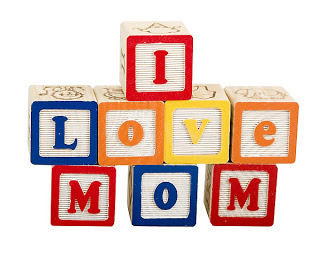 As we were returning from visiting my dad at the extended care facility, Mom said, "Let's stop at the dollar store. I want a mop and a broom."
As we were returning from visiting my dad at the extended care facility, Mom said, "Let's stop at the dollar store. I want a mop and a broom."A mop and a broom it was. "They're just my size," Mom said. She's five feet tall.
"Oh, what are those?" she asked as we walked by some gizmos.
"Toilet bowl scented cleaners," I replied. "Would you like a lemon-scented one?"
"No, I like the ones in the blue package better," so it was potpourri.
"Let's look for baby powder," she said. I replied, "They only had little bottles yesterday," to be told, "That was yesterday." And by golly, they had big ones today. We bought two.
"Let's look for more spray scent. I like the rose." We found it. Two spray cans. I have discovered that any scent that smells even remotely human is unacceptable and must be annihilated.
Also combs--a pack of three: one for her, one for me, and one for my brother.
Total outlay for the splurge? A little over seven dollars. "Why pay more?" she said. "Lots of people shop here to save money.
I think what I mostly saved were memories.
Copyright 2013 by Thomas L. Kepler, all rights reserved
Published on June 12, 2013 13:56
June 6, 2013
Learning to Talk Bear: so bears will listen--a book review
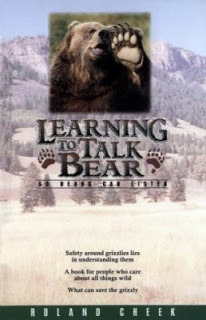 A saying in the military regarding the accuracy of information is "boots on the ground." That is to say, "Has this information been verified first-hand by competent eye witnesses?"
A saying in the military regarding the accuracy of information is "boots on the ground." That is to say, "Has this information been verified first-hand by competent eye witnesses?"Roland Cheek and his book Learning to Talk Bear: so bears will listen is the "boots on the ground" book on the state of grizzly bear survival and management in the United States, specifically in the Montana wilderness and Glacier National Park.
Cheek is an outdoorsman, an outfitter and guide turned writer and journalist. He is a life-long son of the wilderness and a writer with a fine sense of objectivity and balance. His book is an illuminating, enjoyable read that also includes photographs of "Old Ephraim."
The style in which Cheek wrote Learning to Talk Bear is a balance of personal experience written as memoir; objective reporting on scientific, political, and social realities regarding grizzlies; and narratives of bear experiences derived from official reports, news articles, and interviews. The balance of these perspectives enrich one another, fact supporting perspective and drama.
Main characters include scientists, residents of rural Montana, but especially grizzly bears--bears with colorful names such as the Dairy Queen Bear, the Mud Lake Bear, the Lindbergh Lake Sow, and the Rottweiler Bear. Cheek importantly notes, though, that bears that are not known, who live without touching civilization, are just as if not more important than bears both famous and infamous.
Learning to Talk Bear is well-edited and employs a varied approach to subject matter that is both informative and entertaining. The autobiographical elements are the glue that unifies the material. Early on, Cheek's personal experiences with grizzlies are captivating not only because of the drama but also because of his candid admission of his ignorance, and later as the book delves at greater length into the scientific and human social aspects of grizzly existence, knowing Cheek's history provides credibility to his research and analysis.
At the end of the book, Cheek writes: "It was for a selfish reason that I conceived the idea for this book. I wanted to know more about the grizzly." His quest for knowledge becomes our feast of facts. Thank you, Roland Cheek, for writing a readable, informative book that acknowledges that the fate of the grizzly is a gauge to how "wild" our American wilderness truly remains.
Copyright 2013 by Thomas L. Kepler, all rights reserved
Published on June 06, 2013 12:51
May 29, 2013
A Day Out with Mom
 Take care of Dad. Clean the house. Cook.
Take care of Dad. Clean the house. Cook.These are the activities which typically fill my mom's time, especially since my father had his stroke. Now, at 88 years old, my mom is still taking care of my dad, who will by 93 in a month, and is still managing the house. It is becoming more difficult, though, as her eyesight deteriorates from bad to non-existent.
Today we went out for a day to run errands, and what I really enjoyed was to see my 88-year-old deaf and blind mom operating in a different environment.
I enjoyed how sharp her mind still is--more in evidence in an environment that required discerning thought. "Where's the cash?" she asked when we finished our bank business, and she had the exact amount in her mind. "Oh, chocolate donuts!" she said and grabbed a box at the grocery store, wanting something new to eat. We also went home with fresh fried chicken and deli potato salad for lunch.
She is very upset that her eyesight is getting worse. "I just can't see!" she says many times a day. "I don't know what I'm going to do." She has been responsible for maintaining the household most of her life, and the idea of not being able to do that--as well as she wants to because she's blind--is her current challenge. I tell her it's OK to get help at her age, and I think she's beginning to understand.
I've also discovered she likes spicy food. Today she wanted hotdogs for lunch. The other day she wanted barbequed chicken. She was impressed that I bought her all-beef hotdogs instead of chicken and pork ones, which are cheaper. She is impressed with my willingness to take extra time to cook, like boiling water for pasta, or cooking some hamburger helper. I'm also becoming a microwave wizard, learning all kinds of little tricks from my mom and brother. The irony is that I'm a long-time vegetarian and eater of organic foods and don't use the microwave for cooking. I don't try to force my choices on my parents and brother, though. I'm with my family to be a caregiver, not a food fanatic.
It was good to see my mom out on the town with me. We bought vacuum bags, and when I came back with one package of 3, she sent me back for another. She's grateful and happy I'm here with them, though, and even puts up with my hanging my clothes on the line rather than in the dryer--something she gave up when she got bit once while hanging clothes.
She still walks well, as long as the walking surface is even. She grabs my arm and off we go. I took her in for a haircut today. Mom made sure I knew it would only be 12 dollars with the senior discount. Mom wanted to pay, but I told her to keep her money for a rainy day.
"You've been telling me that for a month," she said. Nothing wrong with that mind.
Copyright 2013 by Thomas L. Kepler, all rights reserved
Published on May 29, 2013 19:47
A Day Out with My Mom
 Take care of Dad. Clean the house. Cook.
Take care of Dad. Clean the house. Cook.These are the activities which typically fill my mom's time, especially since my father had his stroke. Now, at 88 years old, my mom is still taking care of my dad, who will by 93 in a month, and is still managing the house. It is becoming more difficult, though, as her eyesight deteriorates from bad to non-existent.
Today we went out for a day to run errands, and what I really enjoyed was to see my 88-year-old deaf and blind mom operating in a different environment.
I enjoyed how sharp her mind still is--more in evidence in an environment that required discerning thought. "Where's the cash?" she asked when we finished our bank business, and she had the exact amount in her mind. "Oh, chocolate donuts!" she said and grabbed a box at the grocery store, wanting something new to eat. We also went home with fresh fried chicken and deli potato salad for lunch.
She is very upset that her eyesight is getting worse. "I just can't see!" she says many times a day. "I don't know what I'm going to do." She has been responsible for maintaining the household most of her life, and the idea of not being able to do that--as well as she wants to because she's blind--is her current challenge. I tell her it's OK to get help at her age, and I think she's beginning to understand.
I've also discovered she likes spicy food. Today she wanted hotdogs for lunch. The other day she wanted barbequed chicken. She was impressed that I bought her all-beef hotdogs instead of chicken and pork ones, which are cheaper. She is impressed with my willingness to take extra time to cook, like boiling water for pasta, or cooking some hamburger helper. I'm also becoming a microwave wizard, learning all kinds of little tricks from my mom and brother. The irony is that I'm a long-time vegetarian and eater of organic foods and don't use the microwave for cooking. I don't try to force my choices on my parents and brother, though. I'm with my family to be a caregiver, not a food fanatic.
It was good to see my mom out on the town with me. We bought vacuum bags, and when I came back with one package of 3, she sent me back for another. She's grateful and happy I'm here with them, though, and even puts up with my hanging my clothes on the line rather than in the dryer--something she gave up when she got bit once while hanging clothes.
She still walks well, as long as the walking surface is even. She grabs my arm and off we go. I took her in for a haircut today. Mom made sure I knew it would only be 12 dollars with the senior discount. Mom wanted to pay, but I told her to keep her money for a rainy day.
"You've been telling me that for a month," she said. Nothing wrong with that mind.
Copyright 2013 by Thomas L. Kepler, all rights reserved
Published on May 29, 2013 19:47
May 22, 2013
The Rules (For the Game of Life): a book review
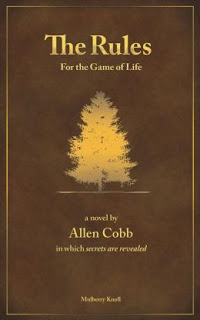 Simply put, The Rules (For the Game of Life) is one of the most enjoyable books I've read in a long time.
Simply put, The Rules (For the Game of Life) is one of the most enjoyable books I've read in a long time.The simple bones of the plot of this novel is that God has conversations with Harvey during the roll-out of Harvey's life. Harvey is the Everyman of the avoid-discomfort-at-all-costs generation. God is surprisingly appropriate to my world view--no noticeable gender, kind, truthful, and willing to occasionally speak in the venacular.
The plot unfolds easily and naturally, without the pretension of jungles or burning bushes (unless one considers Malibu, California, a jungle or desert of sorts). Expect unexpected ideas in a familiar setting--a sort of hitchhiker's guide to consciousness. Harvey meets "the voice" in the pine tree at his sister and brother-in-law's house (who have asked him to move out), on an ocean beach beside his BMW, on a sun-warmed stone in Lake Tahoe, and in the solariam of a retirement home.
The rules, of course, are important to the gravitas of the subject matter--and they hold up quite well. The rules make sense but also allow enough interpretation to stimulate not only the dialogue that comprises much of the book but also the reader's curiosity. This fits in well with the subtitle: An inner dialogue, in which secrets are revealed. The rules, as they are revealed, do have a cummulative effect.
The real power of The Rules (For the Game of Life) pleased me immensely. The real power of the novel isn't secrets from God revealed but the power of Allen Cobb's prose style. The charm of Cobb's prose writing is that it is so easy to read; it is so natural that one just listens and believes. Yes, I'm saying he makes conversing with God totally believable. He makes God a believable character: immense yet compassionate.
For me, the rules were about how we structure a world of our own making, and then we enter into it and live our lives. A great insight for me was how true it is that we live a great deal of our lives on "automatic pilot"--and to judge that as good or bad is missing the point.
One aid I would like to have had with the book is to have access to the list of rules--numbered and all on one page at the back of the book so I wouldn't discover the list until I'd gotten through the book one time. When God says, "Rule number 3, Harvey," I'd like a quick reference to that rule when I read the book again.
And I will read The Rules (For the Game of Life) again. The prose is easy to read, but that doesn't mean the ideas aren't deep. Read this book. I think you'll find it reassuring.
Copyright 2013 by Thomas L. Kepler, all rights reserved
Published on May 22, 2013 13:23
May 19, 2013
The Quiet Man, a movie review
Having been away from home and my wife for three weeks, I was looking forward to watching John Ford's The Quiet Man.
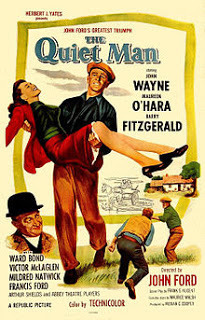 John Wayne gets to show his more sensitive self, Ireland shows its green--welcome after the early Mediterranean browns of California's spring rather than the green spring of Iowa. Maureen O'Hara gets to show her feisty self to best advantage . . .
John Wayne gets to show his more sensitive self, Ireland shows its green--welcome after the early Mediterranean browns of California's spring rather than the green spring of Iowa. Maureen O'Hara gets to show her feisty self to best advantage . . .
And I was moved by Wayne's interpretation of fighter Sean Thornton who has vowed to keep his fists out of the fight. And I did enjoy the green fields heavy with recent rain. (The Quiet Man was the first American major film to have footage shot in Ireland.) Maureen O'Hara was the "fiery Mary Kate," damned if any man was going to tell her what to do and damned if she would love any man who wouldn't and couldn't.
It was the stereotypes that got to me: men violent to women and brawling as a pastime; drunkenness as a national pastime; smoking as the essence of virility. After a while, I had to enjoy the film in spite of its assumptions.
This film was released in the year of my birth. Thank god my growth and my generation's was away from many of the social beliefs of that time. We are a diverse world, and I'm glad to have that understanding as part of who I am. The Irish aren't all drunken brawlers any more than all Americans are violent, gun-packing mobsters.
The movie, though, has its sweet and humorous moments--it's just too bad that when Sean Thornton, aka John Wayne, finally has his epiphany, the resolution of the conflict is determined by who is the best brawler and boozer. With Irish music in the background.
And, yes, I did cry at times during the flick. I really miss my wife.
Copyright 2013 by Thomas L. Kepler, all rights reserved
 John Wayne gets to show his more sensitive self, Ireland shows its green--welcome after the early Mediterranean browns of California's spring rather than the green spring of Iowa. Maureen O'Hara gets to show her feisty self to best advantage . . .
John Wayne gets to show his more sensitive self, Ireland shows its green--welcome after the early Mediterranean browns of California's spring rather than the green spring of Iowa. Maureen O'Hara gets to show her feisty self to best advantage . . .And I was moved by Wayne's interpretation of fighter Sean Thornton who has vowed to keep his fists out of the fight. And I did enjoy the green fields heavy with recent rain. (The Quiet Man was the first American major film to have footage shot in Ireland.) Maureen O'Hara was the "fiery Mary Kate," damned if any man was going to tell her what to do and damned if she would love any man who wouldn't and couldn't.
It was the stereotypes that got to me: men violent to women and brawling as a pastime; drunkenness as a national pastime; smoking as the essence of virility. After a while, I had to enjoy the film in spite of its assumptions.
This film was released in the year of my birth. Thank god my growth and my generation's was away from many of the social beliefs of that time. We are a diverse world, and I'm glad to have that understanding as part of who I am. The Irish aren't all drunken brawlers any more than all Americans are violent, gun-packing mobsters.
The movie, though, has its sweet and humorous moments--it's just too bad that when Sean Thornton, aka John Wayne, finally has his epiphany, the resolution of the conflict is determined by who is the best brawler and boozer. With Irish music in the background.
And, yes, I did cry at times during the flick. I really miss my wife.
Copyright 2013 by Thomas L. Kepler, all rights reserved
Published on May 19, 2013 14:44
May 14, 2013
Care-giving to the Elderly and the View from 100 Years
Helen Keller once mentioned that the world of the blind was not boring but a constant adventure. That is what I call a positive attitude. I am now taking care of my parents and find Keller's optimism even more amazing . . . and inspiring.
My mother is 88 years old and is becoming progressively blind and deaf. She can hear most of what is said if one speaks slowly and loudly into her left ear. He eyesight is failing--and she was legally blind before now. She can see a little out of the corners of her eyes and works around the house mostly by touch and smell. She cares for my dad.
My dad is a month away from 93 years of age. He has a pacemaker and is somewhat mobile--enough to move 20 or 30 feet to the kitchen, bathroom, or living room with a walker. He is extremely forgetful and confused. Recently, he just wants to lie in bed because of dizziness.
I have to honestly say that they do not see their current reality as an adventure but more as a struggle, one they are bravely continuing but with an increasing doubt as to whether it is all worth it. I think right now, they continue on for each other's sake, so that no one will be alone.
I recently read a book titled Having Our Say: The Delany Sisters' First 100 Years. Written by two
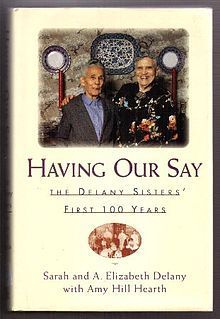 Black American sisters at the ages of 101 and 103, the book is a chronicle of American history from the eyes of two who lived those hundred years and experienced great change for their people and for their nation--for they were unabashedly patriotic. The book is filled with thoughtful and humorous quotations steeped in the wisdom of their years: "Life is short, and it's up to you to make it sweet."
Black American sisters at the ages of 101 and 103, the book is a chronicle of American history from the eyes of two who lived those hundred years and experienced great change for their people and for their nation--for they were unabashedly patriotic. The book is filled with thoughtful and humorous quotations steeped in the wisdom of their years: "Life is short, and it's up to you to make it sweet."
This book was written, though, when Sadie and Bessie Delancy were both alert and active, even in their years. They do talk about their mother, whom they cared for in her last years, and how they had to watch over her because of her wandering mind and feet.
My parents have completed "death with dignity" agreements that are signed by them, their doctor, and by me. These agreements essentially say that if major heart or respiratory failure occur, to let them go rather than being brought back to live in even greater diminished capacity. They've had their adventure and are ready to move on to their final journey when the time arrives.
Like the Sword of Damocles, modern medicine can give you life--even more than you would wish to have. Modern medicine can prolong life and also prolong suffering. And who can say how long a life is enough? Even the individual him or herself may not be able to answer that if the mind is too confused or feeble.
I am not being needlessly depressed, though, nor do I wish to depress anyone reading this. Rather, I am inspired to provide my parents with a good environment. I am inspired to keep myself healthy and to not delude myself that modern medicine can extend our lives beyond our natural time. I am inspired to live my life and to love the world and its people, including myself.
As a young man, my dad and mom would take us camping in the Sierra Nevadas, and my dad would say, "Always leave the campsite in better shape than when you arrived." I think there's great wisdom in that. Enjoy our time in this life. Make our thoughts and actions worthwhile. And don't think breath so precious that we forget that "inspiration" means taking in spirit and therefore overstay our time allotted us.
We shouldn't end our lives saying to ourselves the words of Oliver Hardy: "Here's another nice mess you've gotten me into." There's enough serendipity in the world without our adding to the mess.
My mother is 88 years old and is becoming progressively blind and deaf. She can hear most of what is said if one speaks slowly and loudly into her left ear. He eyesight is failing--and she was legally blind before now. She can see a little out of the corners of her eyes and works around the house mostly by touch and smell. She cares for my dad.
My dad is a month away from 93 years of age. He has a pacemaker and is somewhat mobile--enough to move 20 or 30 feet to the kitchen, bathroom, or living room with a walker. He is extremely forgetful and confused. Recently, he just wants to lie in bed because of dizziness.
I have to honestly say that they do not see their current reality as an adventure but more as a struggle, one they are bravely continuing but with an increasing doubt as to whether it is all worth it. I think right now, they continue on for each other's sake, so that no one will be alone.
I recently read a book titled Having Our Say: The Delany Sisters' First 100 Years. Written by two
 Black American sisters at the ages of 101 and 103, the book is a chronicle of American history from the eyes of two who lived those hundred years and experienced great change for their people and for their nation--for they were unabashedly patriotic. The book is filled with thoughtful and humorous quotations steeped in the wisdom of their years: "Life is short, and it's up to you to make it sweet."
Black American sisters at the ages of 101 and 103, the book is a chronicle of American history from the eyes of two who lived those hundred years and experienced great change for their people and for their nation--for they were unabashedly patriotic. The book is filled with thoughtful and humorous quotations steeped in the wisdom of their years: "Life is short, and it's up to you to make it sweet."This book was written, though, when Sadie and Bessie Delancy were both alert and active, even in their years. They do talk about their mother, whom they cared for in her last years, and how they had to watch over her because of her wandering mind and feet.
My parents have completed "death with dignity" agreements that are signed by them, their doctor, and by me. These agreements essentially say that if major heart or respiratory failure occur, to let them go rather than being brought back to live in even greater diminished capacity. They've had their adventure and are ready to move on to their final journey when the time arrives.
Like the Sword of Damocles, modern medicine can give you life--even more than you would wish to have. Modern medicine can prolong life and also prolong suffering. And who can say how long a life is enough? Even the individual him or herself may not be able to answer that if the mind is too confused or feeble.
I am not being needlessly depressed, though, nor do I wish to depress anyone reading this. Rather, I am inspired to provide my parents with a good environment. I am inspired to keep myself healthy and to not delude myself that modern medicine can extend our lives beyond our natural time. I am inspired to live my life and to love the world and its people, including myself.
As a young man, my dad and mom would take us camping in the Sierra Nevadas, and my dad would say, "Always leave the campsite in better shape than when you arrived." I think there's great wisdom in that. Enjoy our time in this life. Make our thoughts and actions worthwhile. And don't think breath so precious that we forget that "inspiration" means taking in spirit and therefore overstay our time allotted us.
We shouldn't end our lives saying to ourselves the words of Oliver Hardy: "Here's another nice mess you've gotten me into." There's enough serendipity in the world without our adding to the mess.
Published on May 14, 2013 14:04
March 29, 2013
Back to Writing? Maybe a Short Story About a Selkie . . .
 Stamp from the Faroe Islands
Stamp from the Faroe Islands
I have this idea that's been on the back burner for several years.
The story idea is set in the Dragons of Blood and Stone universe, and it's about a selkie. A selkie is a mythological creature of the sea, a seal that can transform into a human being.
The last quarter of school will begin on Monday, and I'm going to try writing again. My most successful adventures in writing while teaching have been to set myself a low, attainable goal . . . and then to stick to that. For me, the key to success is to make the goal low enough that it is easily attainable; then I tend to exceed that goal most weeks and to just barely attain it during a few time-critical points during the school quarter of teaching. I've written three novels this way, two of them published and the third awaiting the summer for a major transformation rewrite. I also haven't written on a creative piece this school year--a major Situation (with a capital S).
My goal for this quarter: to write Monday through Friday at least 120 words a day, for Saturday and Sunday to write at least 200 words per day.
That totals 1,000 words per week, so when the school year ends, I will have written at least 10,000 words. That may not seem much, but my short story "Who Listened to Dragons" is under 9,000 words, and my writing experience with that story was that it was long enough to feel a good, sustained creative flow during the initial writing. When I wrote my novels, the goal was 200 words M-F and 500 on weekends, so I'm being realistic, considering my current teaching responsibilities.
A sustained, creative experience is something that is important to me. I tend to get moody if I don't write regularly. Blogging or non-fiction doesn't seem to provide me with the emotional nurturing that creative writing does. This is no slam to those forms of writing. I am expressing my very individual experience. For many years, I wrote poetry; now, I've focused more on the novel and short story genres.
Sustained, refined attention on language within a particular written piece, I think, allows me to maintain an internal environment that is creative in the most elemental form of the word: engaging in creation. This engagement is positive, nurturing, evolutionary; and it stirs and integrates me through the use of language: memories, sense experience, intellect, emotions, and my sense of self.
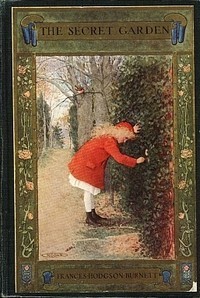 For me, this experience can be likened to opening a door and entering a new environment, my "secret garden," and thanks to Frances Hodgson Burnett for her 1910 novel The Secret Garden. Sometimes that door (or portal for science fiction and fantasy fans) is open and awaiting my entry, sometimes a light knock is required, and sometimes I feel like I'm opening the door with my face. In all cases, especially the last, gentle perseverance is required--and a lively awareness of the wonder of creation and the field of all possibilities.
For me, this experience can be likened to opening a door and entering a new environment, my "secret garden," and thanks to Frances Hodgson Burnett for her 1910 novel The Secret Garden. Sometimes that door (or portal for science fiction and fantasy fans) is open and awaiting my entry, sometimes a light knock is required, and sometimes I feel like I'm opening the door with my face. In all cases, especially the last, gentle perseverance is required--and a lively awareness of the wonder of creation and the field of all possibilities.No wonder I get somewhat grumpy when I don't write.
The plan is simple. I'll start Monday. Wish me luck.
Copyright 2013 by Thomas L. Kepler, all rights reserved
Published on March 29, 2013 03:49
February 15, 2013
On-line Privacy & Tracking: Useful information from the pros
I've used Webroot as an anti-virus program on one of my family's computers for years. Recently, I've switched all our family over to this company, eliminating the automatic coverage from other sources.
It saved me money to consolidate, and I also have always liked Webroot/Zone Alarm's easy accessibility to a human being, rather than endless movement down non-human pathways.
Below is an interesting quick look at online privacy. Yes, there's some marketing embedded in the info, but I feel that' OK.
[image error]
It saved me money to consolidate, and I also have always liked Webroot/Zone Alarm's easy accessibility to a human being, rather than endless movement down non-human pathways.
Below is an interesting quick look at online privacy. Yes, there's some marketing embedded in the info, but I feel that' OK.
[image error]
Published on February 15, 2013 03:33



